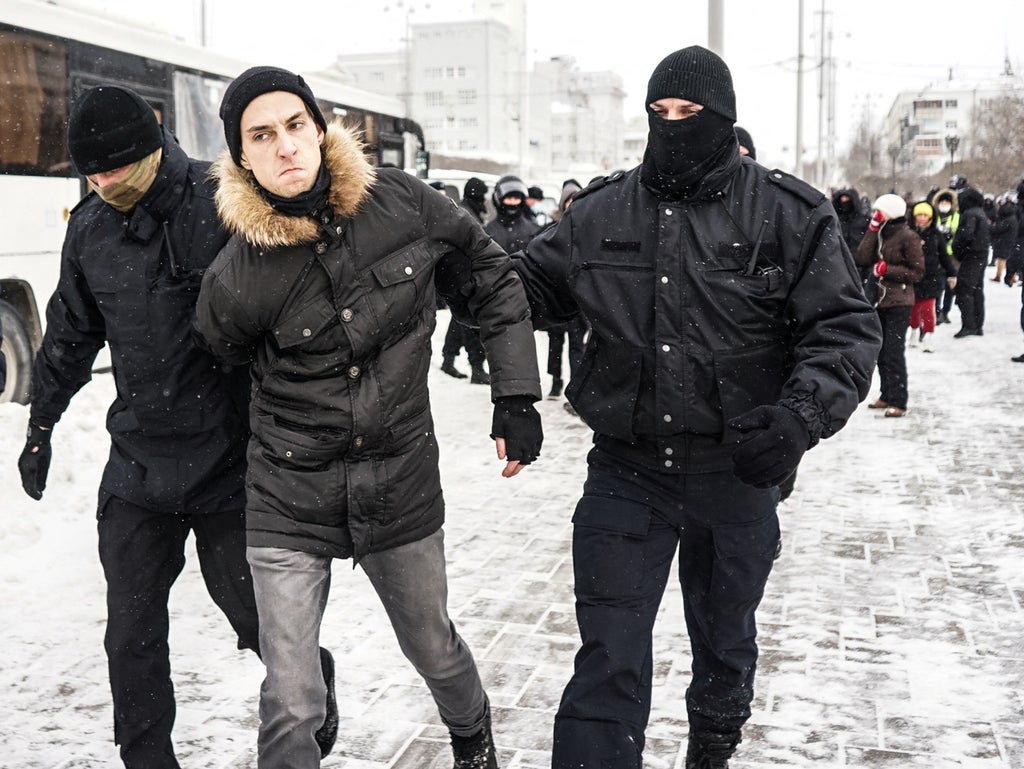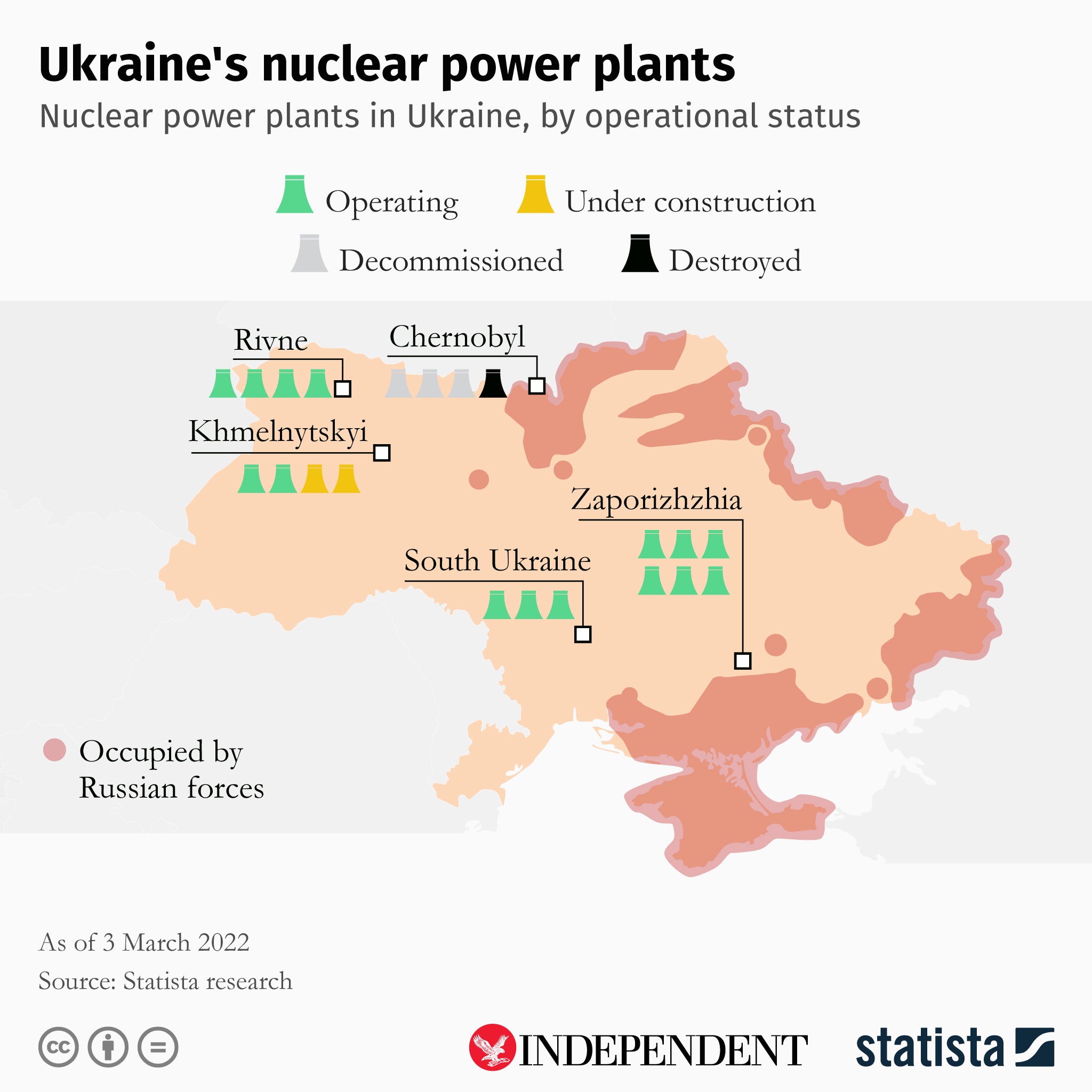
Olga’s mother thinks her daughters have been brainwashed by foreign media propaganda during their visits abroad.
Russian state television is the only reliable source of truth, she tells them.
But Olga and her sister know that in their scepticism they are in a minority in the country, and they can’t get cross with their mum. “It’s a generation thing,” Olga says. “They used to watch TV all the time. As a child, when we had only two TV channels, every day at 9pm we watched TV and the news said America was our enemy. Everyone hated us because Russia tried to be strong and independent. And now it’s the same circle.”
Within her circle of acquaintances in Moscow, about 70 per cent, she estimates, are completely taken in by state “information” that holds that Ukraine is bombing its own citizens, that Russia is conducting a military operation in Ukraine to rid it of its fascist, drug-addicted leaders and, more ominously, that teaches schoolchildren only good comes from the Kremlin and to love their president.
“My sister knows the truth, one of my girl friends knows the truth, her mother knows the truth. But my mum doesn’t,” she tells The Independent.
“I tell her, ‘How can you believe all that? You used to travel to Ukraine. You know there’s no difference between Russians and Ukrainians.’ She doesn’t argue with me but I can see that she also does not agree with me.
“She has a soft, Soviet-era temperament. She tolerates our opinions and knows that we travelled a lot and are treated very friendly everywhere. I think she has internal conflict – to believe us and our experience on one side and believe TV on the other.”
The job of convincing her mother and aunt that they are listening to pure propaganda is made harder for Olga by the closure of independent media since Russia’s offensive began, including the Ekho Moskvy radio station and Dozhd TV. Access to news website Meduza, German broadcaster Deutsche Welle, and the website of Radio Liberty, Svoboda, has been restricted in Russia, too.
Olga – not her real name; she is too scared of the might of the state police to be publicly identified – works as a sales manager for an American company with offices in Moscow and across Europe, and travelling for her job and reading free Western media have enabled her understanding.
She says: “I can see a lot of people around who are brainwashed by propaganda. The TV shows only lies and lies and lies – it’s a big problem. It’s as bad as in Hitler’s Germany, and the reincarnation of Hitler himself.
“I can adapt – people might just say ‘she objects to the president’s decisions’ - but I absolutely disagree with all the suppression going on.”
Ideologically isolated from many of her neighbours and friends, Olga has done what she can to stand up against Russia’s war on its neighbour, risking arrest to take part in three street protests since the start of the war. But now she no longer dare, as Vladimir Putin’s crackdown intensifies. It’s estimated nearly 14,000 people have been arrested across Russia since the invasion began.
“It’s absolutely not safe to express a negative attitude to all that’s going on,” she says. “I’m afraid everyone who disagrees will be jailed if they challenge the lies of the past 20 years.
“Every day for the past 12 days we have had appalling new laws coming in: you can be jailed if you help Ukrainians in any way – not only food or money, but if you give advice you will be considered a state traitor and face up to 15 years’ jail.”

Other laws have restricted how much of their own money Russian citizens may transfer or take out in dollars, and now Olga has had enough and wants to emigrate, possibly to Poland, Germany or Bulgaria.
“Any day we can expect our money may be taken by the state or just – ‘Sorry, you don’t have any money’.”
The war has already distanced Olga from her cousins in Ukraine – “they blame us for not doing anything, but if I was jailed for protesting, would it help?” – and she talks openly only with close friends, those she knows she can trust.
She’s not the only one considering leaving Russia because they can no longer bear it. “My girl friend is the director of a college and officials from the ministry of education came to colleges and schools and force teachers what to say about war, what sort of values to put in their heads. She is seriously considering shutting down the college and leaving the country if nothing changes.
“Sick hospice children were made to come out and stand to form the letter Z like on Russian tanks.”
Putin, she believes, is sick and paranoid, and his ministers and advisers are too afraid of him to tell him the truth: “They reported to him that our medicines, education, schools and military are wonderful but it’s not true. Our own army cannot fight with the arm-less Ukrainians.”
Olga, who spoke to The Independent over the Signal app to prevent her communications being traced, hopes a senior official or minister plots to arrest their own leader and put him on trial “to stop all this madness” – but the problem is “they’re so damn stupid”.

Asked how she feels about what has become of her country, with its rich cultural history that produced Tolstoy, Chekhov, Tchaikovsky and Shostakovich, Olga says she has no sentimentality for it. “I ran away from Russia when the USSR fell apart,” she says. “It was a disaster when they privatised everything and I went to live in Dubai. When I came back in 2006 I couldn’t recognise my country.
“I call it negative selection. People are rude, their behaviour abroad when they travel is horrible – they may throw rubbish in the street, they would step over a dead person in the street. They are horrible to animals.
“They have killed life in forests, in Baikal Lake. Moscow used to be green and beautiful, now you will hardly find any trees.
“Our parliament issues horrible laws. Most of all there’s a complete degradation of medicine, of education, of TV channels, radio, all mass media.
“Maybe the best people were killed in the Second World War or in the revolution or left during Soviet times.”
By contrast, Olga cannot speak highly enough of Ukraine’s Volodymyr Zelensky and Ukrainians’ bravery.
“They are wonderful,” she says.
Tears spring to her eyes as she recalls: “He used to play a student club. It was a game between different universities. They had groups of people joking and Zelensky used to be there and he made a lot of friends in Russia but they are all silent now. None of them speaks up.
“I can see how he’s exhausted and he’s not leaving Kiev. And where is our guy? In a bunker.”
If Olga does move abroad, her instinct is to hide her nationality. When it is pointed out she cannot be blamed, because Russia is not a democracy so citizens did not vote Putin into power, she says: “Yes, we didn’t. But I think I will be so ashamed that I will have to forget I’m Russian for - maybe till the end of my life because Russians are like fascists were in Germany in 1941, 1939.
“For many years we will have to apologise and ask forgiveness of Ukrainians for our leadership, we have to rebuild their country, pay for what we’ve done.”







